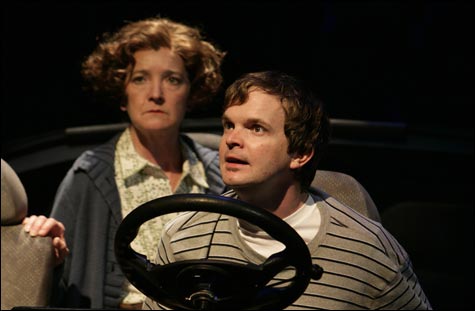
BRENDAN: Nothing like having your deceased mom in the back seat. |
The protagonist of Ronan Noone’s Brendan bestrides the narrow world, but hardly like a colossus. With one foot in Allston and the other back in Ireland, the shy immigrant feels the pull. Then there is that abrupt extra tug when, at the play’s opening, he learns that his domineering mother has died and — as a final controlling act — has embargo’d the news that she was dying until after the fact. Not that her demise proves a vanishing act — it’s more like an opportunity to visit her son without a plane ticket, shadowing him from barroom to boudoir to back seat of a Ford Focus. Such parental haunting stretches from Hamlet to The Glass Menagerie to NBC’s Providence. Yet Brendan, which is getting a lively and loving world premiere from the Huntington Theatre Company (at the Calderwood Pavilion through November 17) that I saw in preview, makes up for some worn devices by being as warm and as sweet as a hot fudge sundae — with Irish-accented profanity sprinkled on top like David Mamet–manufactured sprinkles. (The f-word, it seems, knows no national boundaries.)
Irish-born, Boston-based Noone is the author of the Baile trilogy, which is set in small towns on his native sod — a product relegated here, in Alexander Dodge’s effective set design, to an earthy-looking rent in the mirrored panels of the Hancock Tower. The play is the first of a projected American trilogy that also includes TheAtheist, a Conor McPherson–esque tour de force for a corrupt Kansas journalist that, though written second, was produced first, in New York, London, and, earlier this fall, by the Huntington. A very different dramaturgical animal, Brendan is certainly autobiographical in part, and it piquantly conveys the loneliness of a somewhat hapless stranger in a strange land, clinging to what he knows — in this case, beer and Mozart — while trying to reinvent himself as an American. Moreover, Noone’s sentimental comedy both drolly reduces the American dream — here it comes down to acquiring a car and a girl you don’t pay for — and conveys its power to those not born to it. For all its blunt language and a whiff of amorality, this is a deeply felt, old-fashioned play that dares to make a dramatic highlight of a civic ceremony and toss in a swell of “The Star-Spangled Banner.” In a time of political cynicism and national self-loathing, it’s both a throwback and a breath of fresh air.

But before you decide whether to puke or salute, let me add that Brendan can be very funny. With its Irish-accented, slang-tossing new arrivals brushing up against Bostonians of various sorts, it can also be quite musical — though in a manner more staccato than Noone’s Ireland-set works. And the playwright, as if nodding to the very barrels whose bottoms he might be accusing of scraping, proceeds to update and Americanize such much-trod clichés as the whore with a heart of gold. Here she’s a frank, blowzy, utterly unapologetic working girl who not only initiates the timorous virgin but also becomes his first native-American friend — and then teaches him to drive. There are some fireworks when this liaison comes to the attention of the nice girl downstairs, a Stop & Shop manager with a daintily defacing birthmark, with whom Brendan is tiptoeing into a tongue-tied friendship. But probably neither woman is the love of his life — that would be the tough if ghostly monkey on his back seat, who drove him from home out of a mix of shame and aspiration but loosens up beyond the grave, at least in his imagination, until some closure is possible.
Brendan is nicely acted under Justin Waldman’s fluid direction, which makes effortless the folding, unfolding, and jockeying around of the set. The Irish accents are more convincing than the Boston ones, even though most of the actors are American. Nancy E. Carroll has already proved her clipped way with the Emerald tongue, and she plays both Brendan’s letter-writing sis and his dead mum with an economical mix of tart ire and sadness. Dashiell Eaves conveys the enthusiasm and the anguish of the reticent Brendan. And Kelly McAndrew portrays the freewheeling sex worker with an all-inclusive openness that suggests the Statue of Liberty on her back.
In Christopher Shinn’s Dying City, the fallout is from Iraq rather than from Ireland, and it commingles with the dusty smoke of 9/11. But this spare, painful drama, which is receiving its area premiere at the Lyric Stage Company (through November 11), is less concerned with war and politics than with the way they infiltrate personal lives. The members of the 32-year-old Shinn’s generation are being shaped in the shadow of two conflicts, their parents’ unpopular engagement in Vietnam, and their own immersion in the violent struggle in the Middle East, both of which figure in Dying City — a title that refers to Baghdad but also encompasses New York, where the play takes place in one of the many residential boxes from which stunned inhabitants watched as the towers fell.